23.1.3.4.5.6 (23 > 49)
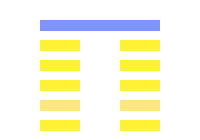
23.1.3.4.5.6 (23 > 49) - THE PO HEXAGRAM
- 1. The first line, divided, shows one overturning the couch by injuring its legs. (The injury will go on to) the destruction of (all) firm correctness, and there will be evil.
- 3. The third line, divided, shows its subject among the overthrowers; but there will be no error.
- 4. The fourth line, divided, shows its subject having overthrown the couch, and (going to injure) the skin (of him who lies on it). There will be evil.
- 5. The fifth line, divided, shows (its subject leading on the others like) a string of fishes, and (obtaining for them) the favour that lights on the inmates of the palace. There will be advantage in every way.
- 6. The topmost line, undivided, shows its subject (as) a great fruit which has not been eaten. The superior man finds (the people again) as a chariot carrying him. The small men (by their course) overthrow their own dwellings.
23.1.3.4.5.6 (23 > 49) - Becoming an accomplice
One is involved in a conspiracy that the others have hatched.
Bing DeepL Google Yandex23.1.3.4.5.6 (23 > 49) - Becoming an accomplice
One is involved in a conspiracy that the others have hatched.
Bing DeepL Google Yandex23.1.3.4.5.6 (23 > 49) - Poh, l’écroulement
Poh : opprimer, renverser, traiter durement.
-
1. Poh, « renverser, faire crouler » son lit en en brisant un pied et le détachant ainsi (suites funestes).
C’est le grand, le prince qui se nuit à lui-même en appauvrissant, affaiblissant son peuple. - 3. Renverser, faire crouler quelque chose sans suite regrettable. C’est quand on le fait légitimement et pour bonnes raisons. C’est que cela atteint également grands et petits (ou abandonne).
-
4. Renverser son lit en s’écorchant, en se nuisant à soi-même, destruction certaine, calamité proche.
Suite de la gradation, en renversant on se blesse -
5. Le prince généreux envers les gens du palais (litt.(/i] : qui enfile des poissons pour en faire présent), en retirera des avantages certains.
Peut-être devrait-on admettre déjà ici l’élément figuratif et symbolique, et voir dans l’hexagramme la figure du prince (ligne pleine supérieure) au-dessus de ses officiers rangés comme des poissons séchés et traduire : avoir des officiers comme des poissons enfilés. Alors, il s’agirait de [i]p’o, gens du palais. -
6. Fruit tout formé qu’on ne mange pas (bien acquis qui se détruit). Le sage, l’homme supérieur conquiert la terre (ou acquiert un char, le peuple qui le porte sur ses bras) ; l’homme bas et vulgaire fait crouler (poh) jusqu’à sa demeure (le fruit formé qu’il ne peut manger).
Il ne pourra plus en user.
23.1.3.4.5.6 (23 > 49) - Devenir complice
On trempe dans un complot que les autres ont ourdi.
Bing DeepL Google Yandex23.1.3.4.5.6 (23 > 49) - Lepusztulás
- 1. Nem látja mit veszít.
- 3. Nem törődik a többiekkel többé.
- 4. Nem akar elviselni többé.
- 5. Látja mi nem működik.
- 6. Elfogadja a veszteséget. Támogatást és lehetőséget kap.
The trigrams
The trigrams are combinations of three yin and yang lines. The three bottom lines of the hexagram form the lower trigram and represent the inner situation. The three top lines form the upper trigram and represent the outer situation.
Upper trigram: The mountain The lake


Lower trigram: The earth The fire


The formation: 23
What is already there

23 - THE PO HEXAGRAM
Po indicates that (in the state which it symbolizes) it will not be advantageous to make a movement in any direction whatever.
Bing DeepL Google Yandex23 - Poh, l’écroulement
Poh : opprimer, renverser, traiter durement.
Texte
Traiter durement ne réussit en rien.
Symbolisme
Montagne (pesant) sur la terre figure l’oppression. C’est aussi le grand affermissant le petit pour donner sécurité à son propre domaine. (Quand les sujets sont en sécurité, ils travaillent, restent en paix et font prospérer le domaine.)
Commentaire
Poh, renverser, abattre. Le petit (parfois) renverse le fort ; l’homme vulgaire grandit. On cède devant lui, mais on cherche à l’arrêter.
Considérant la forme du koua, le sage fait une attention particulière aux successions d’accroissement et de décroissance des êtres, de plénitude et de dépouillement (vide), — semblables aux mouvements du ciel (tels que l’hiver succédant à l’été, la nuit au jour, etc.).
23 - Lepusztulás
Hanyatlás, amit a tartalékok beosztásával lehet hátráltatni.
Bing DeepL Google Yandex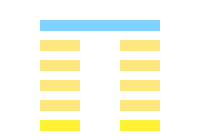
23.1 (23 > 27) - THE PO HEXAGRAM
The first line, divided, shows one overturning the couch by injuring its legs. (The injury will go on to) the destruction of (all) firm correctness, and there will be evil.
Bing DeepL Google Yandex23.1 (23 > 27) - Burying one's head in the sand
One does not see what one loses.
Bing DeepL Google Yandex23.1 (23 > 27) - Burying one's head in the sand
One does not see what one loses.
Bing DeepL Google Yandex23.1 (23 > 27) - Poh, l’écroulement
Poh : opprimer, renverser, traiter durement.
Poh, « renverser, faire crouler » son lit en en brisant un pied et le détachant ainsi (suites funestes).
C’est le grand, le prince qui se nuit à lui-même en appauvrissant, affaiblissant son peuple.
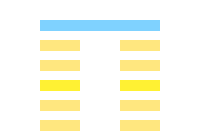
23.3 (23 > 52) - THE PO HEXAGRAM
The third line, divided, shows its subject among the overthrowers; but there will be no error.
Bing DeepL Google Yandex23.3 (23 > 52) - Poh, l’écroulement
Poh : opprimer, renverser, traiter durement.
Renverser, faire crouler quelque chose sans suite regrettable. C’est quand on le fait légitimement et pour bonnes raisons. C’est que cela atteint également grands et petits (ou abandonne).
Bing DeepL Google Yandex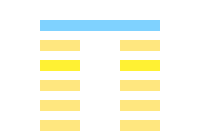
23.4 (23 > 35) - THE PO HEXAGRAM
The fourth line, divided, shows its subject having overthrown the couch, and (going to injure) the skin (of him who lies on it). There will be evil.
Bing DeepL Google Yandex23.4 (23 > 35) - Poh, l’écroulement
Poh : opprimer, renverser, traiter durement.
Renverser son lit en s’écorchant, en se nuisant à soi-même, destruction certaine, calamité proche.
Suite de la gradation, en renversant on se blesse
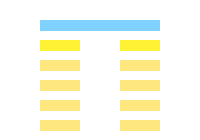
23.5 (23 > 20) - THE PO HEXAGRAM
The fifth line, divided, shows (its subject leading on the others like) a string of fishes, and (obtaining for them) the favour that lights on the inmates of the palace. There will be advantage in every way.
Bing DeepL Google Yandex23.5 (23 > 20) - Poh, l’écroulement
Poh : opprimer, renverser, traiter durement.
Le prince généreux envers les gens du palais (litt.(/i] : qui enfile des poissons pour en faire présent), en retirera des avantages certains.
Peut-être devrait-on admettre déjà ici l’élément figuratif et symbolique, et voir dans l’hexagramme la figure du prince (ligne pleine supérieure) au-dessus de ses officiers rangés comme des poissons séchés et traduire : avoir des officiers comme des poissons enfilés. Alors, il s’agirait de [i]p’o, gens du palais.

23.6 (23 > 2) - THE PO HEXAGRAM
The topmost line, undivided, shows its subject (as) a great fruit which has not been eaten. The superior man finds (the people again) as a chariot carrying him. The small men (by their course) overthrow their own dwellings.
Bing DeepL Google Yandex23.6 (23 > 2) - Choosing to leave
One accepts the rupture. One will obtain supports and means of action.
Bing DeepL Google Yandex23.6 (23 > 2) - Choosing to leave
One accepts the rupture. One will obtain supports and means of action.
Bing DeepL Google Yandex23.6 (23 > 2) - Poh, l’écroulement
Poh : opprimer, renverser, traiter durement.
Fruit tout formé qu’on ne mange pas (bien acquis qui se détruit). Le sage, l’homme supérieur conquiert la terre (ou acquiert un char, le peuple qui le porte sur ses bras) ; l’homme bas et vulgaire fait crouler (poh) jusqu’à sa demeure (le fruit formé qu’il ne peut manger).
Il ne pourra plus en user.
23.6 (23 > 2) - Préférer partir
On accepte la rupture. On obtiendra des soutiens et des moyens d'action.
Bing DeepL Google Yandex23.6 (23 > 2) - Lepusztulás
Elfogadja a veszteséget. Támogatást és lehetőséget kap.
Bing DeepL Google YandexIn the making: 49
What is poised to happen
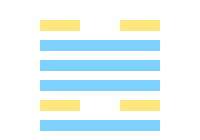
49 - THE KO HEXAGRAM.
(What takes place as indicated by) Ko is believed in only after it has been accomplished. There will be great progress and success. Advantage will come from being firm and correct. (In that case) occasion for repentance will disappear.
Bing DeepL Google Yandex49 - Tidying up
Renewal is necessary when shortcomings are identified and a replacement plan is in place. One will then have an interest in making the changes. Forget about regrets.
Bing DeepL Google Yandex49 - Tidying up
Renewal is necessary when shortcomings are identified and a replacement plan is in place. One will then have an interest in making the changes. Forget about regrets.
Bing DeepL Google Yandex49 - Koh, la révolution, la mue
Koh : 1. Peau, cuir, tanner, écorcher ; 2. Changer, différer.
Ko « changement, amélioration ». Quand, après avoir parlé, on se montre digne de confiance, tout suit un heureux cours, et le repentir disparaît (n’a plus de raison d’être).
Texte
Quand (on change) et qu’on devient sincèrement droit, on sera après cela constamment sans regret.
Symbolisme
L’eau sous le feu figure le changement. L’homme supérieur règle ses calculs (le calendrier) d’après les changements du ciel et annonce les temps et les saisons. — Dans les marais même il y a du feu.
Commentaire
L’eau et le feu, arrêtant mutuellement leur action, figurent koh. Il en est de même de deux soeurs habitant ensemble et de volontés différentes, opposées.
Après un certain temps, se montrer sincère, c’est changer, se corriger ; on inspire alors confiance. Par le talent et l’intelligence, on acquiert la satisfaction ; par de grands progrès en vertu, on acquiert la rectitude. Quand on change de cette manière, tous les sujets de regret disparaissent.
Le ciel et la terre changeant, les quatre saisons s’accomplissent. Tang et Wuh-Wang changèrent le décret céleste. Ainsi, ils obéirent au ciel et répondirent au désir des hommes. Grand, en effet, et bien important est le moment des changements.
Note. Tang est le chef de la dynastie Shang, qui enleva le trône au dernier des Hia (Ire dynastie), devenu tyran. Wuh-Wang renversa de même le dernier des Shang et lui enleva le décret céleste qui l’avait fait roi.
Note. Le § 1 prend le mot koh dans le sens de cuir ; les autres dans l’acception de changement, changement de conduite, correction ; changement d’ordres, de dispositions chez le sage et le grand ; changement des saisons, le plus important de tous, dit un commentaire
49 - Ranger
Le renouvellement est nécessaire quand on constate des insuffisances et que l'on a un plan de remplacement. On aura alors intérêt à mener les changements à bien. Oublier les regrets.
Bing DeepL Google Yandex49 - Vándor
Megújulásra van szükség ha hiányosságok tapasztalhatók és tartalék tervre. Az lesz az érdekük, hogy befejezzék a változást. El kell felejteni a megbánást.
Bing DeepL Google YandexThe nuclear hexagram: 2.2.3.4.5.6 (2 > 44)
The nuclear hexagram is the association of the two inner trigrams (lines 2,3,4 and 3,4,5). It represents the root, or the origin of the situation.
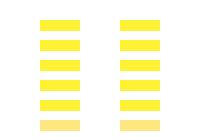
2.2.3.4.5.6 (2 > 44) - THE KHWĂN HEXAGRAM
- 2. The second line, divided,(shows the attribute of) being straight, square, and great. (Its operation), without repeated efforts, will be in every respect advantageous.
- 3. The third line, divided, (shows its subject) keeping his excellence under restraint, but firmly maintaining it. If he should have occasion to engage in the king's service, though he will not claim the success (for himself), he will bring affairs to a good issue.
- 4. The fourth line, divided, (shows the symbol of) a sack tied up. There will be no ground for blame or for praise.
- 5. The fifth line, divided, (shows) the yellow lower garment. There will be great good fortune.
- 6. The sixth line, divided (shows) dragons fighting in the wild. Their blood is purple and yellow.
2.2.3.4.5.6 (2 > 44) - Obedience
When all the weight is on the weakest, the building can only collapse.
Bing DeepL Google Yandex2.2.3.4.5.6 (2 > 44) - Obedience
When all the weight is on the weakest, the building can only collapse.
Bing DeepL Google Yandex2.2.3.4.5.6 (2 > 44) - Kwūn, la réceptivité
Kwūn : a) Principe passif, réceptif. 1. Terre étendue et portant ; 2. Femme, femelle ; 3. Soumission, complaisance ; 4. Support, appui. — b) Kwun, fermer, lier. c) Kwun : vêtement impérial.
-
2. Droite, carrée, vaste (la terre), d’elle-même et sans travail, procure toujours des biens à l’homme.
La voie de la terre est brillante, produit de grandes choses. -
3. Celui qui maintient les lois (du ciel et de la terre) peut espérer le succès. Quand on s’applique au service du prince, si on ne le fait pas parfaitement, on devra le quitter. Bien qu’on ne le fasse pas d’abord parfaitement, on pourra réussir à la fin.
Il brillera à l’occasion. Savoir se conduire est glorieux et grand.
Note. (Ceci se rapporte au sens : soumission, docilité.) -
4. (Sens kwun, fermé.) Sac lié, fermé, ne peut être loué ou blâmé (quant à son contenu).
La prudence évite toute injure, tout dommage.
(Le sac fermé est la terre, dont le contenu est inconnu et caché. C’est aussi l’image de la prudence nécessaire à celui qui sert le prince.) -
5. Kwun, vêtement impérial. Ou « vêtement de dessous jaune ». Figure de la terre qui est jaune et sous le ciel.
La beauté, le bel arrangement est en elle (et se montre au-dehors).
Le texte ajoute : Honneur, bonheur suprême. -
6. Le dragon combat dans l’espace ; son sang est noirâtre et jaunâtre. (Reprise du koua précédent : le principe actif lutte dans l’immensité pour produire ; il produit le ciel qui est noirâtre et la terre qui est jaunâtre, selon la terminologie chinoise.)
(Cette phrase finale s’applique à la fois aux deux premiers koua.)
2.2.3.4.5.6 (2 > 44) - L'obéissance
Quand tout le poids repose sur les plus faibles, l’édifice ne peut que s’écrouler.
Bing DeepL Google Yandex2.2.3.4.5.6 (2 > 44) - Engedelmesség
- 2. Nem hallgat a véleményekre mert eltévedtek, de később kérdezni fog.
- 3. Feladataiban csak a szükségessel kell törődnie.
- 4. Nem tér vissza míg a legrátermettebb ki nem javítja a hibákat.
- 5. A szerénység sikerre vezet.
- 6. Meglep másokat mert kérdés nélkül cselekszik.
Ruler
The starting situation

23.6 (23 > 2) - THE PO HEXAGRAM
The topmost line, undivided, shows its subject (as) a great fruit which has not been eaten. The superior man finds (the people again) as a chariot carrying him. The small men (by their course) overthrow their own dwellings.
Bing DeepL Google Yandex23.6 (23 > 2) - Choosing to leave
One accepts the rupture. One will obtain supports and means of action.
Bing DeepL Google Yandex23.6 (23 > 2) - Choosing to leave
One accepts the rupture. One will obtain supports and means of action.
Bing DeepL Google Yandex23.6 (23 > 2) - Poh, l’écroulement
Poh : opprimer, renverser, traiter durement.
Fruit tout formé qu’on ne mange pas (bien acquis qui se détruit). Le sage, l’homme supérieur conquiert la terre (ou acquiert un char, le peuple qui le porte sur ses bras) ; l’homme bas et vulgaire fait crouler (poh) jusqu’à sa demeure (le fruit formé qu’il ne peut manger).
Il ne pourra plus en user.
23.6 (23 > 2) - Préférer partir
On accepte la rupture. On obtiendra des soutiens et des moyens d'action.
Bing DeepL Google Yandex23.6 (23 > 2) - Lepusztulás
Elfogadja a veszteséget. Támogatást és lehetőséget kap.
Bing DeepL Google YandexCorrection
The direction where the ruler is going to bend
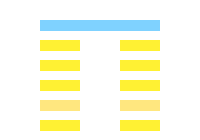
23.1.3.4.5 (23 > 13) - THE PO HEXAGRAM
- 1. The first line, divided, shows one overturning the couch by injuring its legs. (The injury will go on to) the destruction of (all) firm correctness, and there will be evil.
- 3. The third line, divided, shows its subject among the overthrowers; but there will be no error.
- 4. The fourth line, divided, shows its subject having overthrown the couch, and (going to injure) the skin (of him who lies on it). There will be evil.
- 5. The fifth line, divided, shows (its subject leading on the others like) a string of fishes, and (obtaining for them) the favour that lights on the inmates of the palace. There will be advantage in every way.
23.1.3.4.5 (23 > 13) - Chasing intruders
Others order one to leave their domain.
Bing DeepL Google Yandex23.1.3.4.5 (23 > 13) - Chasing intruders
Others order one to leave their domain.
Bing DeepL Google Yandex23.1.3.4.5 (23 > 13) - Poh, l’écroulement
Poh : opprimer, renverser, traiter durement.
-
1. Poh, « renverser, faire crouler » son lit en en brisant un pied et le détachant ainsi (suites funestes).
C’est le grand, le prince qui se nuit à lui-même en appauvrissant, affaiblissant son peuple. - 3. Renverser, faire crouler quelque chose sans suite regrettable. C’est quand on le fait légitimement et pour bonnes raisons. C’est que cela atteint également grands et petits (ou abandonne).
-
4. Renverser son lit en s’écorchant, en se nuisant à soi-même, destruction certaine, calamité proche.
Suite de la gradation, en renversant on se blesse -
5. Le prince généreux envers les gens du palais (litt.(/i] : qui enfile des poissons pour en faire présent), en retirera des avantages certains.
Peut-être devrait-on admettre déjà ici l’élément figuratif et symbolique, et voir dans l’hexagramme la figure du prince (ligne pleine supérieure) au-dessus de ses officiers rangés comme des poissons séchés et traduire : avoir des officiers comme des poissons enfilés. Alors, il s’agirait de [i]p’o, gens du palais.
23.1.3.4.5 (23 > 13) - Chasser les intrus
Les autres ordonnent que l'on sorte de leur domaine.
Bing DeepL Google Yandex23.1.3.4.5 (23 > 13) - Lepusztulás
- 1. Nem látja mit veszít.
- 3. Nem törődik a többiekkel többé.
- 4. Nem akar elviselni többé.
- 5. Látja mi nem működik.

